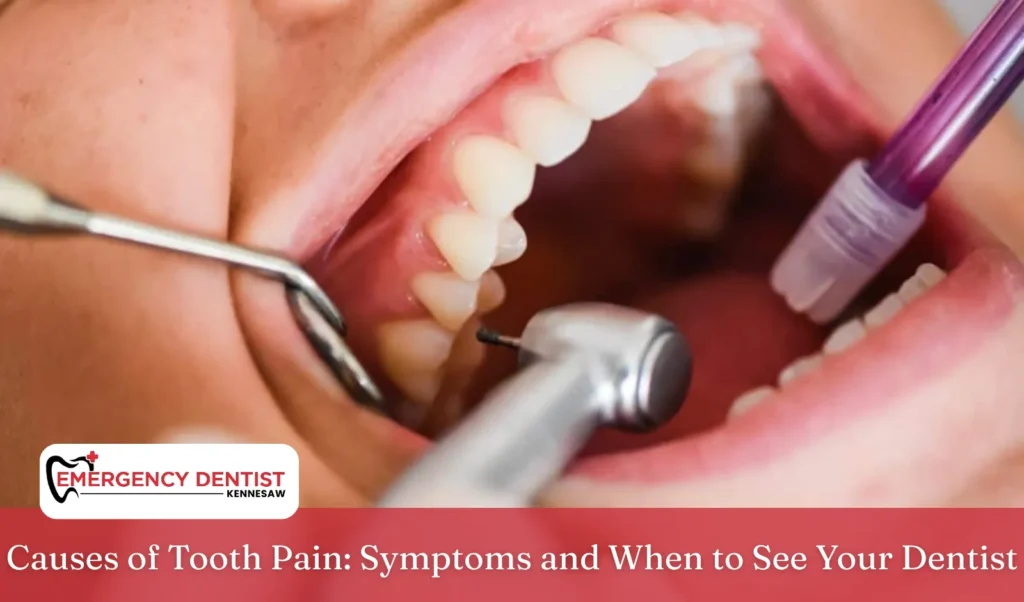Causes of Tooth Pain: Symptoms and When to See Your Dentist

Tooth pain is a common issue that can affect anyone, ranging from a dull ache to a sharp, intense pain that demands immediate attention. Whether the pain is caused by tooth decay pain, tooth infection pain, or discomfort from gum tissue inflammation, understanding what causes tooth pain is the first step toward relief. In this article, we will explore the tooth pain causes and symptoms, including those that affect both teeth and gums, and when it’s time to consult a dental professional.
What Causes Tooth Pain?
There are a variety of tooth pain causes, ranging from poor oral hygiene habits to underlying health issues. Most often, pain stems from issues affecting the soft tissue, nerves, or gum tissue surrounding your teeth. Here are some of the most common causes:
1. Tooth Decay Pain

Tooth decay is one of the most common tooth pain causes. In the early stages, it erodes the enamel, which can expose sensitive nerves and lead to discomfort or tooth sensitivity. If left untreated, tooth decay can progress into cavities, resulting in tooth cavity pain and increasing the risk of a tooth abscess or bacterial infection.
Prevention tip: Protect your enamel by brushing your teeth with fluoride toothpaste at least twice a day.
2. Hole in Tooth Pain
A visible hole in the tooth usually signals advanced decay. You may experience sharp pain when chewing or discomfort when consuming hot or cold food and beverages. This type of tooth pain symptoms indicates that professional dental treatment is needed to avoid further complications.
3. Tooth Infection Pain and Abscess Tooth Pain

If decay reaches deep into the tooth, it can cause a tooth infection, which may lead to the formation of a tooth abscess. Abscess tooth pain is often severe, accompanied by facial swelling, pus, and bad taste in the mouth. If left untreated, this can lead to serious complications and may even affect the affected area of the jaw or nearby tissues.
Urgent tip: If you’re experiencing intense pain, swelling, or fever, seek immediate care from a dental professional.
4. Gum Disease and Tooth Pain
Poor brushing and flossing habits can lead to plaque buildup, which irritates the gum tissue and causes gum disease. This inflammation often results in gum pain by tooth, bleeding, and tenderness. If untreated, gum disease can progress, leading to long-term damage, tooth loss, or even loose tooth pain.
Healthy habit: Brush and floss regularly to prevent gum disease and tooth pain.
5. Loose Tooth Pain
Experiencing loose tooth pain as an adult isn’t normal. This can result from gum disease, trauma, or weakening of the structures supporting your teeth. The pain is often triggered by biting or chewing and may be accompanied by swelling in the gum tissue surrounding the tooth.
6. Cold and Tooth Pain

If drinking cold beverages causes a sharp twinge of pain, you may have cold and tooth pain. This sensitivity could be due to enamel erosion, gum recession, or tiny cracks in your teeth that expose sensitive nerves.
Tip: Try fluoride toothpaste to reduce tooth sensitivity and avoid acidic foods that worsen enamel erosion.
7. Tooth Pain Symptoms to Watch
Recognizing early tooth pain symptoms can help prevent more serious issues. Common symptoms include:
- Persistent ache or sharp pain
- Red, swollen gums
- Pain triggered by brushing or flossing
- Sensitivity to hot, cold, or sweet foods
- Bad taste or bad breath
- A visible hole in the tooth
- Swollen jaw or face
8. The Role of Dry Mouth
A dry mouth reduces the production of saliva, which normally helps wash away bacteria. This can increase the risk of tooth decay pain, cavities, and infections. Dry mouth may be caused by medications, dehydration, or breathing through your mouth while sleeping.
9. Sinus Infections and Tooth Pain
Sinus infections can also lead to tooth pain, particularly in the upper teeth. The pressure from a sinus infection can cause dental pain that may feel like a toothache. If you have sinus congestion along with tooth pain symptoms, it’s important to differentiate between sinus-related discomfort and other dental issues.
10. Home Remedies and When to Call Your Dentist

While home remedies like saltwater rinses or clove oil may temporarily ease discomfort, they cannot replace professional dental treatment. If your tooth pain symptoms last for more than 48 hours, worsen, or are accompanied by fever or swelling, call your dental professional immediately.
Final Thoughts
Tooth pain causes are diverse, but early intervention can often prevent further damage. Whether it’s tooth decay pain, gum disease and tooth pain, or the threat of a tooth abscess, timely care from a dental professional is key. Regular brushing and flossing, using fluoride toothpaste, and routine checkups can help you avoid many of the most common causes of tooth pain.
Unsure about your symptoms? Connect with a trusted dental professional in Kennesaw and restore your smile with confidence.


